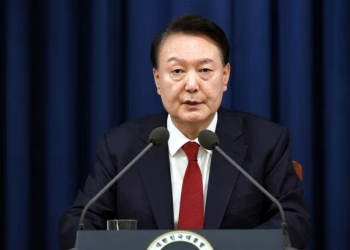A Chinese spacecraft with a three-person crew, which includes the country’s first female space engineer, has successfully docked following a journey of over six hours.
The crew will spend six months aboard the domestically developed space station, conducting experiments and performing spacewalks as Beijing gains experience and intelligence for its goal of landing humans on the Moon by 2030.
China hailed the launch of Shenzhou 19 as a “complete success,” marking one of 100 planned launches in a record-breaking year of space exploration as it seeks to surpass the United States.
The BBC had rare access to the Jiuquan Satellite Launch Center in Gansu, witnessing the spacecraft’s liftoff from just over a kilometer away. As the rocket ignited, flames shot from the launcher, illuminating the Gobi Desert with a thunderous roar.
Crowds gathered along the streets, cheering and waving as the taikonauts—China’s term for astronauts—set off.
Just two years ago, President Xi Jinping proclaimed the ambition to explore space, develop the industry, and establish China as a space power as an “eternal dream.” However, some in Washington perceive this ambition and rapid progress as a serious threat.
Earlier this year, NASA chief Bill Nelson stated that the US and China are essentially in a race to return to the Moon, with concerns that Beijing aims to assert territorial claims there. He expressed doubts about the civilian nature of China’s space program, suggesting it has military implications.
In Dongfeng Space City, the launch site’s support town, China’s space program is celebrated. Every street light bears the national flag, and parks feature astronaut figurines while plastic rockets adorn traffic roundabouts. A large poster featuring Xi Jinping alongside the Shenzhou spacecraft greets visitors to the main compound.
After midnight, hundreds gathered to wave flags and lights as the taikonauts took their final steps on Earth before heading to the launch site. A brass band played “Ode to the Motherland,” while children, faces painted with the Chinese flag, sang along in excitement.
Cai Xuzhe, the mission’s pilot and a veteran, expressed confidence in his younger crewmates, including Wang Haoze, the first female space engineer, stating, “Their youthful energy has made me feel younger and even more confident.” He promised dedication to their mission, emphasizing their commitment to achieving new milestones in China’s crewed space endeavors.
Song Lingdong, another crew member, recalled being inspired as a child watching China’s early space missions, which motivated him to become a pilot to serve his country. The crew embodies a new generation of space travelers, highlighting China’s investment in its future.
China has already begun selecting its next group of astronauts for potential lunar missions and for crewing the space station. “I am determined not to let down the trust placed in me,” Song asserted, vowing to enhance China’s reputation in space.
China has made headlines recently with notable achievements in its space program, including retrieving rock and soil samples from the far side of the Moon and landing a spacecraft on Mars, becoming only the second nation to do so. The country has an expanding fleet of satellites and ambitious plans for more, including the launch of 18 satellites for a projected constellation of 14,000 aimed at providing global broadband internet coverage.
While some US officials express concern about the potential militarization of this technology, China’s space agency director, Li Yingliang, described their endeavors as a “collective mission for humanity,” downplaying the idea of competition. He emphasized China’s commitment to peaceful space exploration and international collaboration.
However, the new space race extends beyond reaching the Moon—it’s about controlling its resources, which include valuable minerals and metals. Estimates of the Moon’s resource worth vary widely, highlighting the financial stakes involved.
Chinese experts emphasize the practical benefits of their space station experiments, which include research on osteoporosis and muscle atrophy that could lead to new treatments on Earth.
Despite China’s advancements, officials acknowledge the challenges ahead, particularly in landing a crew on the Moon. They remain committed to their vision of space exploration, drawing inspiration from past achievements.
Even as China’s economy faces slow growth, President Xi appears to prioritize the space program. International media are invited to witness progress, though access is heavily restricted, with journalists kept in hotels far from the launch site and monitored during outings.
Warnings against leaking secrets are evident, underscoring the seriousness with which China approaches its technological advancements amid ongoing rivalry with the United States. The competition is no longer limited to Earth, as the two superpowers may soon be vying for territorial claims beyond our planet.
















